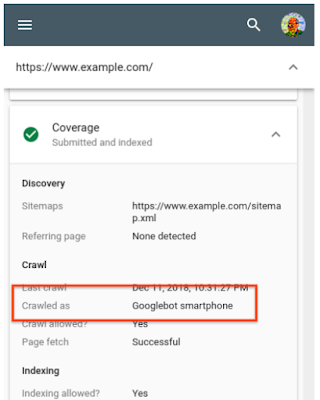It’s Official from Google Webmaster: All Website Search Rankings on Google will Now Run on Mobile-First Indexing
Building from its announcements in the last three years, Google Webmaster has announced all websites should embrace Mobile-first indexing. The decision comes a year after Google first announced Mobile-first Indexing concept for smartphones. Googlebot crawls websites on smartphones and compares the difference of responsiveness and content of a website between its desktop and mobile versions.
John Mueller, Developer Advocate, Google Zurich posted the announcement in an official Google Webmaster blog. He wrote, “We’re happy to announce that mobile-first indexing will be enabled by default for all new, previously unknown to Google Search, websites starting July 1, 2019. It’s fantastic to see that new websites are now generally showing users – and search engines – the same content on both mobile and desktop devices!”
What Mobile-first Indexing Means for your Content Management and Content Marketing
With the mobile-first indexing coming in full-force from 1 July, we expect SEO, Content Management and Marketing teams to huddle together. There would be significant impact on the UI/UX and responsiveness of the websites, if they are to meet the benchmark standards of Google Webmasters crawling on smartphone devices.
As we see a rampant rise in Google users consuming information on their smartphones, Mobile-first indexing would be very important for new domains. Older websites or existing ones, Google confirmed that they would closely monitor their pages to evaluate them based on existing best practices for Content Marketing and Search Indexing.
Here is a quick guide on what you should do to stay on top of Mobile-first indexing best practices.
- You should have a mobile-friendly website. Today, it’s far more easy to pick a mobile responsive theme from Content Management Systems than it was in the early part of the decade.
- Your website should have the same content on your Mobile version as on desktop. If you have lesser content on Mobile, you should consider optimize that to come at par with your desktop version.
- Your images, texts, and videos should be optimized for Mobile-first responsiveness, crawling and indexing best practices.
- You can no longer escape with poor SEO. Missing out on metadata descriptions should be present across both versions of your websites.
- Your robots.txt and ronot meta tags should work as intended on both websites.
When did this all begin?
Google started experimenting with Mobile-first indexing in November 2016. The experiments took shape to enable smartphone users to find relevant websites and information based on their search inputs in the query tab. In 2016, the company had planned that Google algorithms will “eventually primarily use the mobile version of a site’s content to rank pages from that site, to understand structured data, and to show snippets from those pages in our results.”

In December 2017, Google officially announced its roadmap to help and index websites optimize their mobile versions. In December 2018 and then again in March 2019, Google outlined that Mobile-first indexing would be evaluating every content gathered by mobile-first indexing. Based on their documentation, it states that “content gathered by mobile-first indexing has no ranking advantage over mobile content that’s not yet gathered this way or desktop content.”
in his conclusion, John wrote, “While we continue to support responsive web design, dynamic serving, and separate mobile URLs for mobile websites, we recommend responsive web design for new websites. Because of issues and confusion we’ve seen from separate mobile URLs over the years, both from search engines and users, we recommend using a single URL for both desktop and mobile websites.”
We expect Google algorithms to make it easy for publishers to make their content management and website content marketing easier and more personalized in the coming weeks.
To participate in our Editorial Blogs, write to us at news@martechseries-67ee47.ingress-bonde.easywp.com











